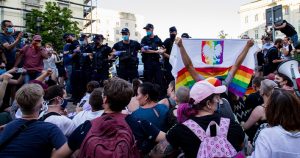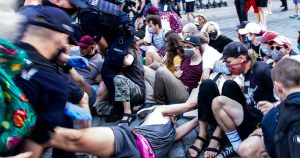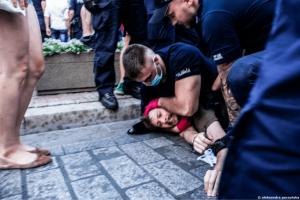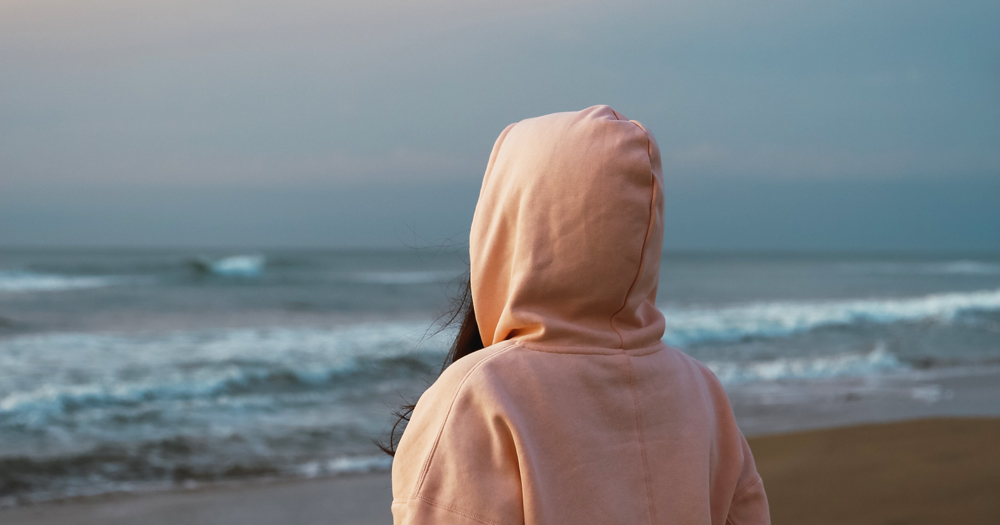A queer person who left Poland and moved to Ireland for their own safety shares how it felt to live in a country which increasingly made them feel unwelcome as it removed their human rights. In order to protect the identities of their loved ones still living in Poland, they have decided to remain anonymous.
It’s tricky trying to mark the beginning of the rampant queer phobia in Poland, just as it’s tricky trying to mark the point I knew I had to leave my life there. I don’t really say it took me two weeks after the presidential election to pack my bags, however fancy that might sound, it was really the result of years of alienation, oppression, and anger intertwined with hopelessness.
Some felt the campaign of hatred truly started when several of the ruling political party (PiS) officials, along with president Andrzej Duda at his rallies, took to the “LGBT is not people, it’s an ideology” narrative. Liberals could be seen awkwardly defending them because, you know, they didn’t really mean to dehumanise you. Queers became alarmed.
I found myself somewhere between that and being too desensitised to really be outraged, as I would be many times over throughout the following months of horrific news. Of course it made sense for them to say it. I knew exactly what my government thought of me, and their prejudice was a high-value political currency in a society like mine. What else could I expect from a president whose first veto, post taking office in 2015, curbed chances of a more dignified route for transgender people to legally affirm their identity?
To this day we have to take our parents to court, following dreary years of battling doctors, bigotry and bureaucracy, because Duda doesn’t see us for who we are, and he decided that a clear and uniform procedure would open a door to “homosexuals” marrying and raising kids. A concept he so despises he would later use it in the final days leading to his re-election, proposing a constitutional ban of adoption for individuals in same-sex relationships.
Mind you, his major centre-right rivals never opposed him openly in that regard; the Civic Coalition’s first candidate, Kidawa-Blonska, dismissed it in a presidential debate as “not a significant concern of the nation at this time”, while her successor in the race, Trzaskowski, reassured he was against adoption despite supporting same-sex partnerships, reportedly “not to risk losing centrist votes.” The “LGBT rights card” he signed as President of Warsaw was never actually enacted. In some regards, Trzaskowski’s election could have halted Poland’s ride off the cliff, maybe even saving some gays in the process. But are he and his party who ruled for eight years before PiS primarily a source of disillusionment? Yes.

The Left put forward Biedron as our first openly gay presidential candidate. That failed. His low result in the first round gave out the signal that promising anything more to the progressive electorate wouldn’t even be worth the hassle for Trzaskowski. It was just a little disturbing seeing his winks toward Confederation, the similarly fundamentalist, just more-capitalist-than-PiS political party, of the alt-right flavour. Duda had no qualms talking about the broad common ground between himself and a party who say no to, quote, Jews, gays, abortion, taxes, and the EU. Their voters may claim to be enemies on an “economical basis”, but one could easily attribute many of Confederation leader, Krzysztof Bosak’s statements from the debates to Duda, such as when he spoke of citizens taking to the streets of Bialystok and Lublin “in defence of family.” Meaning the Eastern cities in which people threw stones at kids and had explosives found in their backpacks at Pride marches, respectively.
Poland eventually spiralled into a blur of verbal attacks, news of more municipalities adopting anti-LGBT resolutions, queer suicides, beatings, day after day. I couldn’t look my family in the eye. I was isolated from my friends in quarantine. I was terrified of leaving my house. The last few weeks were a wave of hurt and panic pounding on me every morning and every night. We begged one another to go to the polls no matter what. I don’t even want to think about how corrupted and how close the final vote was. They won and I left.
Back in Poland, a queer activist called Margot from Stop Bzdurom was arrested for attacking one of the vans that, to this day, drive around cities escorted by police to yell crude homophobic nonsense aiming to “stop paedophilia.” Along with her, dozens of people who gathered in solidarity, or just walked the nearby streets, were brutally assaulted and humiliated in police stations.

In the face of all this, there’s a rush of tone policing and symmetrism equating civil disobedience and property damage to the crimes of the oppressive system that they fight against. They blame activism for somehow spoiling our image and setting us back.
Oddly and luckily or not, what I’m not observing so much of in my Polish circles is the bizarre wave of anti-trans – but you know, I’m-not-transphobic-just-gender-critical – sentiments that are on the rise elsewhere. I frankly don’t think Poland has any time for that.
Obviously right-wingers didn’t target trans people specifically in this campaign because we don’t have many rights to be deprived of in the first place; we don’t really exist as trans people to them. Amid queers it seems, at the very least, logical to have each other’s backs when you’re being lumped together as a “rainbow plague” (an actual hashtag for LGBT-related news used by the television station TVP) where all you hear from the speakers is that you’re a paedophilic lobby, a menace that destroys the country.
Then there’s the more convoluted, less cruel – is it, really? – queerphobia that tells you that you’re imagining your oppression, that it’s a phase, that you’ve gone astray, that your “lifestyle” or transition are a result of peer pressure. Things that aren’t generally acceptable to say to a cis gay in the West but are present in the “trans debate”, on top of the endless insinuation of our treacherousness. I can only hope that the queer rights movement in Poland will keep marching as one, and if some members of the community manage to gain acceptance, backs won’t be turned on others.

A top politician in Poland described my new country as a queer dystopia that betrayed every last bit of its Catholic righteousness. No matter how much I like the vision Mr Kaczynski warns me about, I know Ireland faces a multitude of struggles I’m only beginning to understand. But I also know I was able to show up in the middle of Dublin and feel safe among protesters with rainbow flags and banners condemning the arrests in Warsaw, all while getting messages from my Polish friends fearing for their lives if they did the same in their cities.
I know I choked up seeing rainbows crafted by kids in the windows of my street, and finding out they were there to cheer you up during the lockdown. You wouldn’t hear about rainbow spotting in Poland; when a Polish person hangs up a Pride flag in solidarity, they gets their windows smashed and walls sprayed with valentines from white power nationalists.
I know I can ride the train in Ireland and nobody will give me a second glance, even if the anxiety remains in the back of my head. I know the owners of my favourite camera shop alternate between welcoming me with “sir”, “my love” and “God bless you.” I know I exchanged dozens of unbearably heartwarming DMs with Irish queers as I jumped on the plane, and that I can reach out and find my community, someday, when I’m not afraid of everything.
Do I feel right about it all? My fear is my only justification for lack of action back in Poland. My escape was motivated by survival instinct but I wish it didn’t have to be this way. All I ever did was support my loved ones and exist in my body, which I would occasionally be told gave courage to some kid, though it isn’t even an option for me to present in a “conforming” way at this point. Will this article be my first tiny step, and shine some light on the struggles of my siblings back home?
Poland is crying out for help.
© 2020 GCN (Gay Community News). All rights reserved.
Support GCN
GCN is a free, vital resource for Ireland’s LGBTQ+ community since 1988.
GCN is a trading name of National LGBT Federation CLG, a registered charity - Charity Number: 20034580.
GCN relies on the generous support of the community and allies to sustain the crucial work that we do. Producing GCN is costly, and, in an industry which has been hugely impacted by rising costs, we need your support to help sustain and grow this vital resource.
Supporting GCN for as little as €1.99 per month will help us continue our work as Ireland’s free, independent LGBTQ+ media.
